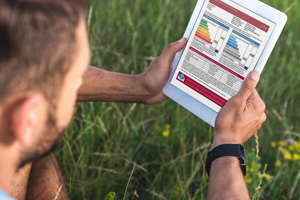 The Church of England's Energy Footprint Tool (EFT) is the first step for churches in understanding your carbon footprint.
The Church of England's Energy Footprint Tool (EFT) is the first step for churches in understanding your carbon footprint.
As the deadline for churches to log data from 2023’s energy bills is approaching in July 31st, we spoke with St Luke’s Church in Crosby about how using the tool helped cut their energy bill by £570.
Paul Beardwood, eco team member at St Luke’s, Crosby has been using the EFT since it launched as part of the Parish Returns System, in 2020.
Paul said: “We were primarily using it to see where we could save money as energy costs were soaring. It gives you an overview of the energy you’ve used for the year, and you can track how much you’ve spent as well as the carbon emissions.
“It did highlight a couple of things, so we started looking a bit more closely at the usage of our building, and how much it was costing us to use different areas of the building.”
Paul said using the Energy Footprint Tool was the impetus that led to more detailed investigations, leading to some simple but effective changes in the way the church buildings are used – including turning their heating thermostat down to 17°C.
“In 2021 we saved a bit, then last year because of some changes we made, we’d saved 10% off our gas bill compared to our EFT results in 2022, that’s amounted to £570 which is quite significant,” said Paul.
“It’s also reduced our carbon 10.6 tonnes to 9.6 tonnes so it’s great that’s coming down. It is encouraging progress to have made some difference, and now we’re looking at changes to our gas system to help get us closer to net zero.”
Paul said the EFT takes around 15 minutes for him to complete each year as he gathers monthly energy bills.
He said: “As long as you have access to your bills it’s fairly simple, I don’t find it arduous. It’s been well worth it for us as it gave us encouragement.”
He added: “I’m actually taking meter reads between bookings so I know exactly what’s been used for our energy, you don’t need to do that for the EFT but if you want to go more detailed it’s helped us.
“We realised that some rooms were more efficient than others. One of the main things that came out of it last year was that when people are booking to use the church buildings, we find out now if they actually need that size of space, and if they don’t, we ask if they can they use a smaller space.
“For communions we had been heating the full church for 3 hours before people arrived, to accommodate 15-20 people. Now they use a smaller room which is just as effective for the purpose, but costs us a lot less to heat.
“We’ve turned the thermostat down too, we now keep the church at 17°C rather than 19°C.
“It was a bit of a shock at first, we did let the congregation know this is what we were planning to do as an Eco Church. We bought some recycled rugs people could put over their knees and some people have used those, but people have got used to it now and it doesn’t really get mentioned.
“It’s a psychological shift. We want church to be a welcoming space and a warm place but there’s a fine balance. There is some peace of mind in doing this, as an Eco Church we do feel it is our responsibility as a church body to be on this journey.”
Phil Leigh, Diocesan Environmental Officer and Net Zero Carbon 2030 Programme Lead said: “It’s great to see how tracking your carbon footprint can make a difference to churches individually, in terms of both cost and reducing your impact on the environment.
“Collectively, we need churches help in doing this via the EFT, so we can understand our carbon footprint across the diocese.
“The deadline for all churches to log your data is July 31st, so please do offer encouragement to your treasurers and eco champions to complete this. You just need your energy bills for 2023 and we’re here to help if you have any questions.
“This is vital baseline data so we can see where we might need to direct resources to have the biggest impact, as we work together towards being net zero carbon 2030. Thank you to all who have already completed this important task to help care for God’s creation.”
Find out more
Watch a Quickfire Questions video below to find out more about using the Energy Footprint Tool and find out more here.
Email Phil and the NZC2030 team here with any questions: nzc@liverpool.anglican.org.uk